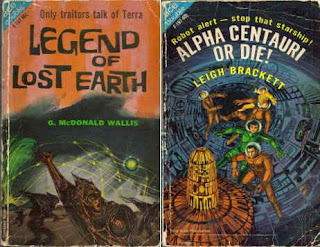Geraldine McDonald Wallis was born June 17, 1925. As far as I can determine, she is still alive (though that's hardly a definitive statement). She would be 93. In honor of her birthday, I'm reposting a review of one of her two Ace Doubles. I hated the other one (The Light of Lilith), but this one is a bit better.
Often in researching the history of these stories I find unexpected stuff. The surprise this time was when I looked up Wallis. G. McDonald Wallis's full name was Geraldine June McDonald Wallis (b. 1925). She published one other Ace Double, The Light of Lilith (1961), backed with Damon Knight's The Sun Saboteurs, (aka "The Earth Quarter", and one of Knight's greatest novellas). As far as the ISFDB knows, that's all she published. Not much of interest there, but the Locus Index revealed an interesting addition to her bibliography. As Hope Campbell, she published a Young Adult ghost story/detective story called Looking for Hamlet in 1987. Hope Campbell, it turns out, has quite an extensive career as a Young Adult author. Other titles include Liza (1965), Home to Hawaii (1967), Why Not Join the Giraffes? (1969), Meanwhile, Back at the Castle (1970), and several more. Her publisher even reprinted Legend of Lost Earth under the Hope Campbell name in 1977. (A Hope Campbell also had a story in Dime Detective Magazine in 1948, and several other stories earlier in the '40s in the romance pulps, but I don't know if that would be the same person. Maybe, but maybe not, as the first of those romance stories would have appeared when she was about 17.) Many of her books would presumably have been available to me when I was a young adult myself, but I admit I never heard of her. (According to her bio in front of this book, she was raised in "Hawaii and the Orient", and was an actress in radio, TV, and summer stock.)
 |
| (Covers by Richard Powers and Jack Gaughan) |
Alpha Centauri - Or Die! is not one of Brackett's best novels. One problem is that it is fairly straightforward science fiction, without the frisson of Dunsany-esque fantastical imagery that so drives her best work. (Though there is a High Martian woman on hand. Also, one should note that Brackett did some fine work in the pure SF idiom, such as The Big Jump and The Long Tomorrow.)
 |
| (Cover by Kelly Freas) |
 |
| (Cover by Kelly Freas) |
This novel opens on Mars, in a future dominated by Williamsonian robots. These robots have taken over dangerous jobs such as space travel, for reasons of safety and to prevent war. Apparently humans are restricted in other ways as well. A band of humans, led by former pilot Kirby and his Martian wife Shari, refurbish an old ship, the Lucy B. Davenport, and plan an escape to Alpha Centauri. They get away, but soon they have to fight off a robot ship that chases them down. Years later, they reach Alpha Centauri, and they find an inhabitable planet. But the planet is occupied by creatures with teleporting powers. Can they make accommodation with these creatures? And can they fend off the Robot ship that has followed?
Mediocre stuff, really, though Brackett is never unreadable, and I did enjoy the book.
Legend of Lost Earth is actually a rather interesting book, though it takes an anti-technological view that I found annoying. Giles Cuchlainn is a young man on the planet Niflhel. This is a harsh planet, with little water, no plant life to speak of, industrial mills spewing soot into the air, a red sun invisible behind the soot and clouds. Doctrine holds that there are no other planets, and that men originated on Niflhel. Giles holds to this doctrine, but one night he attends a meeting of Earth Worshippers, who believe in a lovely green planet called Earth, the true home of men. There he meets an intriguing young woman, testing his loyalty to his longtime lover.
Soon he is recruited to spy on the Earth Worshippers, but his loyalty is thing. He attends another meeting and learns the story of how humans fled a destroyed Earth, ending up at Niflhel. He decides to save the Earth Worshippers from persecution, and then mysteriously finds himself on Earth. The ending is curious and rather mystical. To some extent the final surprise is predictable, but Wallis makes some unusual use of her revelations. She also incorporates some Celtic mythology It's not a great book, but it is interesting and somewhat original.
No comments:
Post a Comment